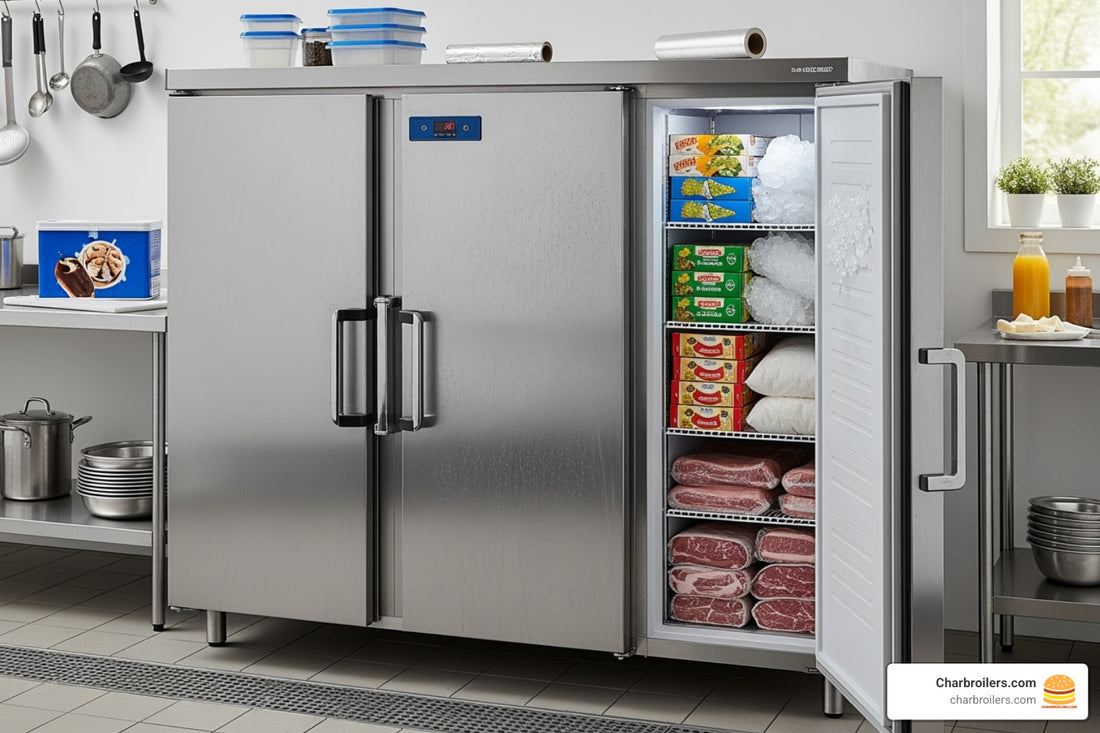
Finding the Perfect Commercial Deep Freezer for Your Business Needs
Share
Why Commercial Cold Storage Is Critical for Your Business Success
A commercial deep freezer is an essential piece of equipment designed for heavy-duty use in restaurants, grocery stores, and other food service businesses. While residential models focus on style, commercial freezers prioritize durability, capacity, and consistent temperature control for non-stop operation.
Key differences between commercial and residential deep freezers:
- Power and capacity: Commercial units offer significantly more storage space and cooling power
- Recovery time: Commercial freezers bounce back faster after door openings
- Construction: Built with tougher components designed for continuous use
- Temperature consistency: Maintains stable temperatures essential for food safety compliance
- Durability: Engineered to withstand the demands of busy commercial kitchens
Cold storage is more than a convenience; it's a legal necessity for most food businesses. Proper freezing slows bacterial growth, preserves flavor, and prevents spoilage, supporting health and safety standards.
Choosing the right commercial freezer affects your food quality, health code compliance, and bottom line. This guide will cover selecting, installing, and maintaining the perfect unit for your business.
I'm Sean Kearney from Charbroilers.com, and with over a decade of experience in the restaurant equipment industry, I've helped countless businesses find the right commercial deep freezer solutions at fair prices. My background includes working at Amazon.com before founding The Restaurant Warehouse, giving me unique insights into what makes commercial kitchen equipment truly work for busy food service operations.
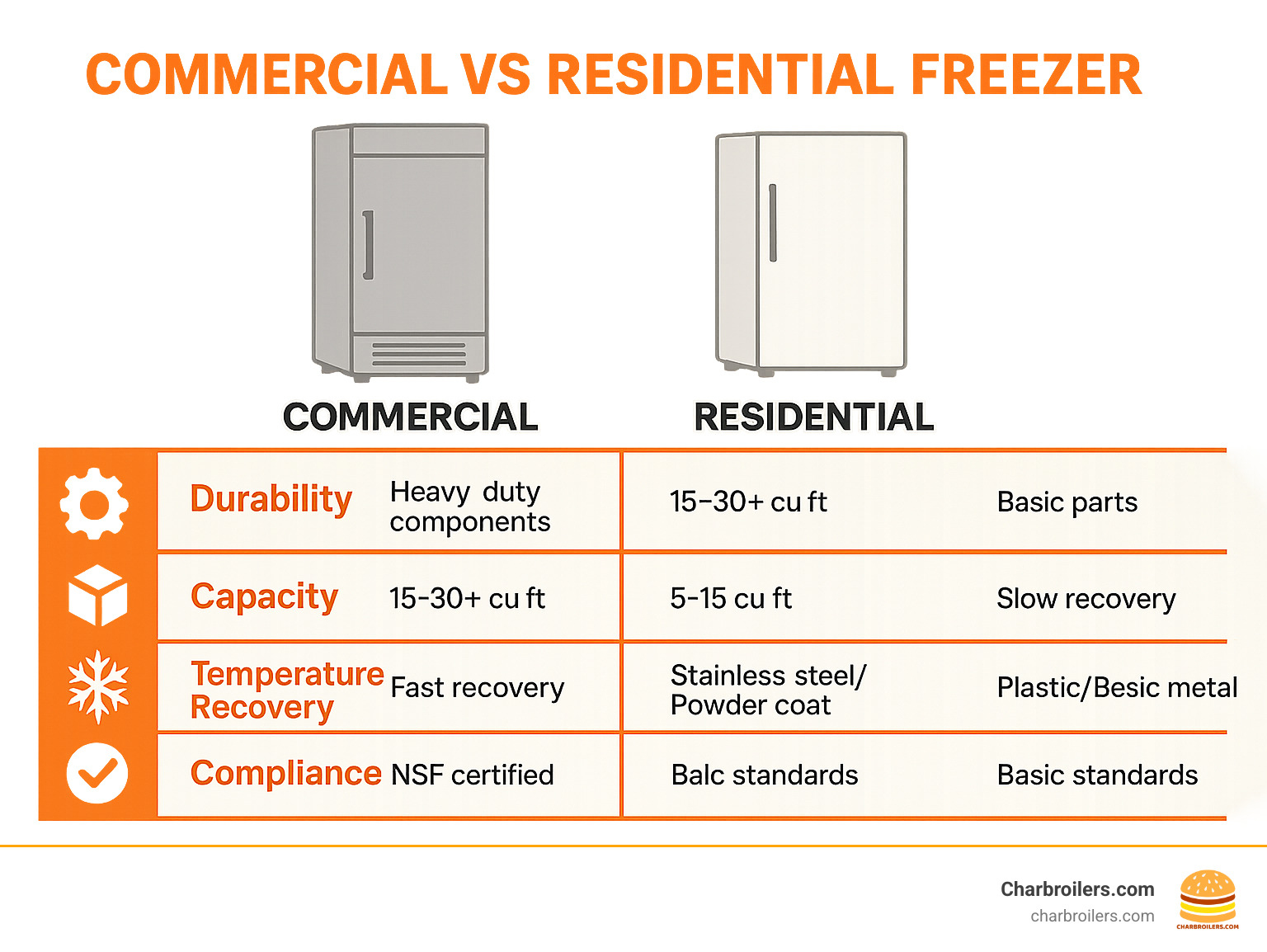
Commercial deep freezer terms simplified:
- commercial upright frost free freezer
- nsf ansi standard 7 commercial refrigerators and freezers
- small commercial freezer
Why Your Business Needs a Commercial Freezer, Not a Residential One
A residential freezer won't cut it for your business. Many owners try to save money with home freezers, only to face spoiled inventory and failed health inspections later.
Commercial deep freezer units are built like workhorses. They feature heavy-duty components designed to run 24/7 without breaking down. While your home freezer might handle a few door openings per day, commercial units are engineered for constant use in busy kitchens where staff are grabbing ingredients every few minutes.
The real game-changer is temperature consistency. Commercial freezers maintain steady temperatures even during peak service hours. When your kitchen staff opens the door dozens of times during dinner rush, a commercial unit bounces back to proper temperature in minutes, not hours. This faster recovery time isn't just convenient - it's essential for food safety.
Food safety compliance is non-negotiable. Commercial freezers meet strict health department standards, often with NSF certification, ensuring they prevent contamination and maintain safe temperatures. This protects your customers and your business. You can dive deeper into these requirements in our Guide to NSF/ANSI Standard 7 for Commercial Freezers.
Different business types rely on commercial freezers for specific needs. Restaurants need bulk storage for everything from prime cuts of meat to prep ingredients and desserts. The capacity and reliability of a commercial deep freezer keeps their kitchen running smoothly during busy service periods.
Supermarkets require even more storage space and often use multiple freezer types - from large chest freezers for bulk items to glass-door display units that showcase frozen foods to customers. Meanwhile, ice cream parlors depend on specialized freezers that maintain the precise temperatures needed to keep ice cream at perfect serving consistency.
The bottom line? A residential freezer is designed for a family of four. A commercial freezer is built for a business that serves hundreds of customers. The durability, performance, and compliance features aren't just nice-to-haves - they're essential for any serious food service operation.
Choosing the Right Type and Size for Your Operations
Choosing the right commercial deep freezer means understanding your needs. Consider bulk storage versus accessibility, your available footprint, and any merchandising needs. Let's explore the main types to help you decide.
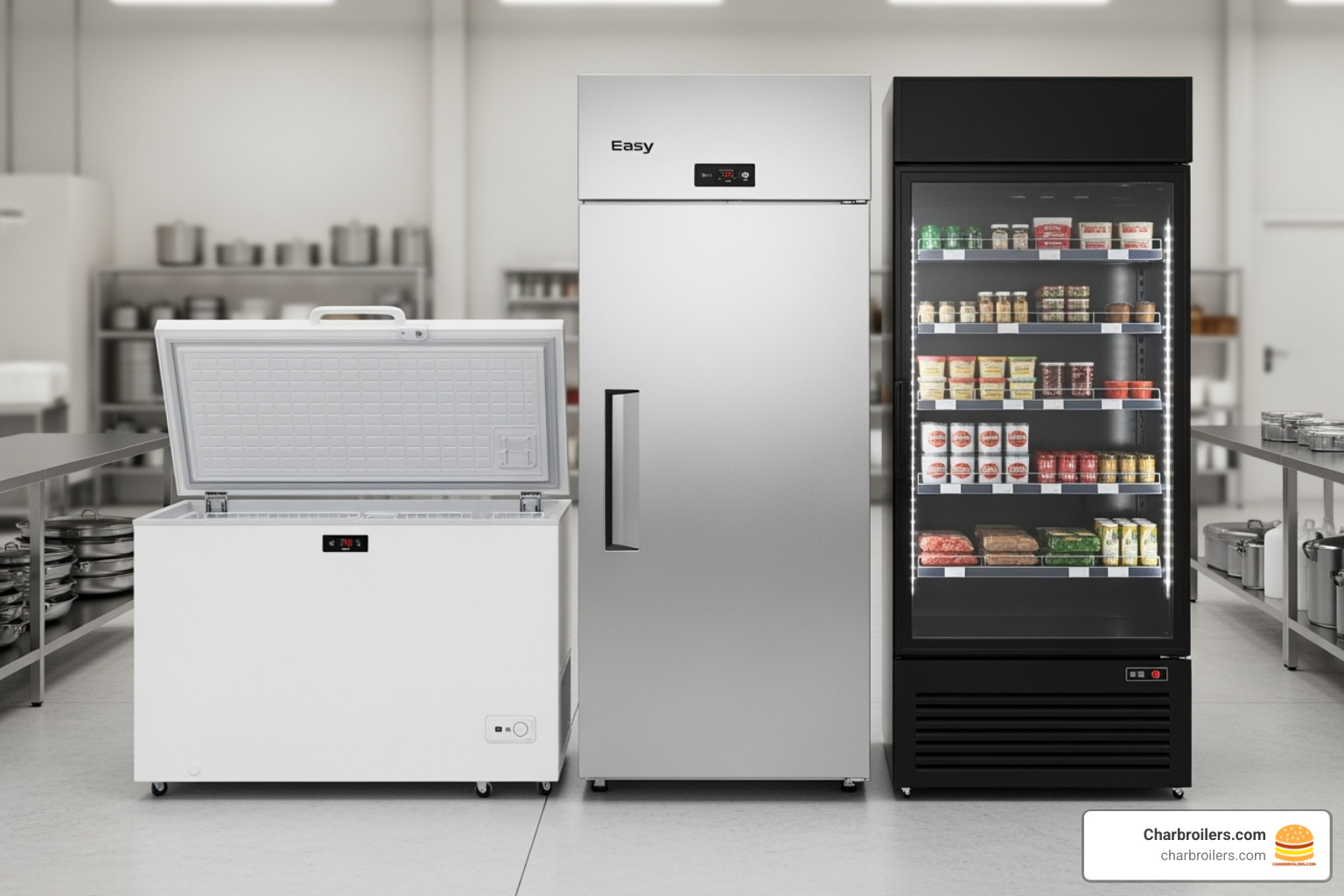
Chest Freezers: The Bulk Storage Champions
Chest freezers are the workhorses for bulk storage. These commercial deep freezer units are perfect for stashing large quantities of meats, packaged foods, and other inventory you don't need to access constantly.
Their top-opening design is key: cold air stays inside when the lid is lifted, unlike with upright models. This makes chest freezers highly energy efficient, especially when full, which helps lower utility bills.
Most chest freezers use manual defrost systems, which might sound like a hassle, but it actually helps them maintain more stable temperatures for long-term storage. They're perfect for back-of-house operations where you're storing your reserves rather than constantly grabbing ingredients.
If you're considering a chest freezer, our Ultimate Guide to Commercial Cool Chest Freezers: 3.5, 5.4, and 7 Cu. Ft. Models breaks down the different sizes to help you find your perfect match.
Upright Freezers: Accessibility and Organization
When space is tight or you need to grab ingredients quickly during the dinner rush, upright freezers are your best friend. These units have a smaller footprint than chest freezers - they grow up instead of out, making them ideal for cramped kitchens.
The real magic happens inside with their shelving system. No more playing freezer archaeology, digging through layers to find what you need. Everything's visible and within easy access, which is a game-changer for kitchens with high product turnover.
Many upright models offer frost-free options too, which means you can skip the manual defrosting routine entirely. They might use a bit more energy than chest freezers since cold air escapes when you open the door, but the convenience often makes it worthwhile for busy operations.
Want to learn more about these convenient units? Check out our guide on Commercial Upright Frost-Free Freezers That Keep Their Cool.
Display and Specialty Freezers
Sometimes your freezer needs to do double duty - keeping things frozen while showing off your products. That's where display freezers shine. These merchandising focused units typically feature glass doors that let customers browse without opening the freezer and letting all that cold air escape.
From ice cream cabinets that showcase your frozen treats to vertical merchandisers perfect for frozen meals, these freezers are designed for customer-facing placement. They turn your frozen inventory into an attractive display that can actually boost sales.
Don't overlook specialty options either - glass frosters for bars that keep glassware perfectly chilled, or island freezers for retail spaces that need high-volume access. These specialized units prove that the right freezer can be both functional and profitable.
If you're looking for smaller specialized units that pack a punch, our Cool Picks: Top Small Commercial Freezers to Keep Your Products Fresh guide has some excellent options to consider.
Key Features to Look for in a Commercial Deep Freezer
Choosing a commercial deep freezer isn't just about size or price. The right features will handle daily demands and prevent future headaches. Focus on capacity, construction, technology, and user-friendly details.
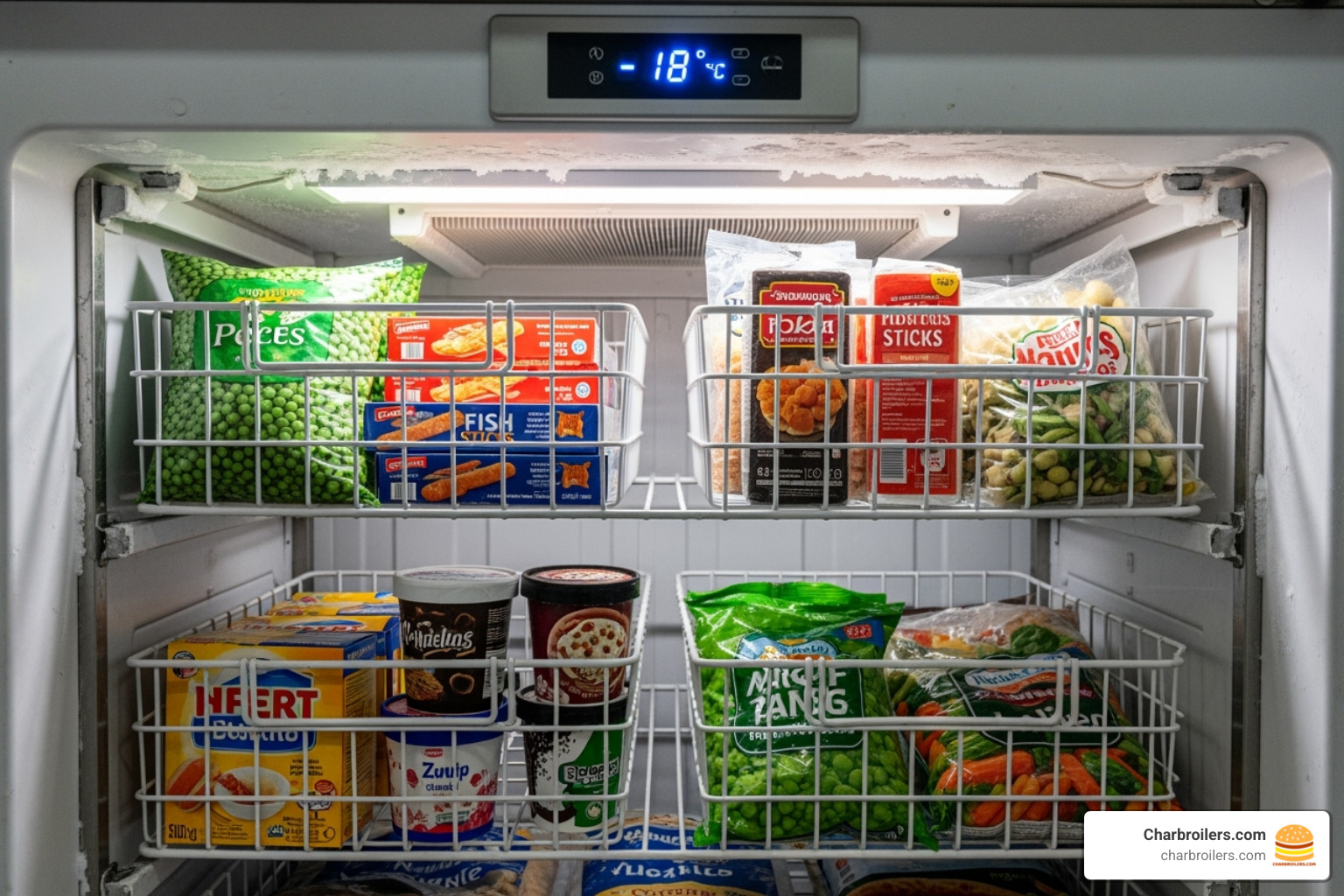
Capacity and Dimensions
Commercial deep freezer capacity is measured in cubic feet (cu. ft.). Bigger isn't always better; the key is matching the freezer's capacity to your typical inventory levels and business volume.
If you're running a small café, a compact 3.5 cu. ft. model might be perfect for your daily needs. But if you're managing a busy restaurant that goes through cases of frozen ingredients every week, you'll want to look at larger units that can handle 21 to 30 cubic feet of product. The key is matching your typical inventory levels with the right capacity.
Don't forget about the physical space, though. That shiny new freezer needs to actually fit in your kitchen layout. You'll need clearance for ventilation, room for the door to swing open, and enough space to load and unload without doing gymnastics. For tight quarters, under-cabinet models can be lifesavers – check out our guide on Space Savers: Best Under Cabinet Freezers for Small Kitchens for some clever space-saving ideas.
Construction, Insulation, and Finishes
The construction of a commercial deep freezer sets it apart from residential units. They are built to survive the chaos of a busy kitchen.
The exterior finish matters more than you might think. Stainless steel is the gold standard – it looks professional, resists dents and scratches, and cleans up beautifully. If budget's tight, a white powder-coated finish gives you similar durability and easy maintenance at a lower cost.
But the real magic happens with the insulation. Thick wall insulation is what keeps your products at safe temperatures even when the kitchen gets hot and busy. This isn't just about energy savings (though that's nice too) – it's about maintaining consistent temperatures that keep your food safe and your health inspector happy.
Inside, you'll typically find embossed aluminum lining. It's tough enough to handle daily abuse, easy to clean, and helps maintain that hygienic environment your business depends on.
Technology and Performance of a commercial deep freezer
Modern commercial deep freezer units pack some impressive technology under the hood. Adjustable thermostats give you precise control over temperatures – crucial when you're storing different types of frozen products that might have specific requirements.
You'll encounter two main defrost types, and each has its place. Manual defrost units tend to be more energy-efficient and maintain colder, more consistent temperatures. The trade-off? You'll need to defrost them periodically. Auto-defrost models handle this automatically, saving you time but using a bit more energy.
The compressor is the heart of your freezer, and modern units use advanced compressor technology with eco-friendly refrigerants. Quality manufacturers like those behind BESTTOP units achieve impressive reliability – we're talking about a 0.3% defect rate compared to the industry average of 1.8%. That's backed by solid warranties, including 5-year compressor coverage.
Want to dive deeper into how all this technology works together? Our article on advanced refrigeration technology breaks it down in detail.
User-Friendly Features
The little things can make a huge difference in your daily operations. Removable baskets might seem like a small detail, but they're absolute game-changers for organization. Instead of digging through a pile of frozen goods, you can lift out entire sections to find what you need.
Lid locks provide security for valuable inventory – especially important if your freezer is in a semi-public area. Interior lighting eliminates the guessing game when you're searching for items, while easy-to-clean surfaces make maintenance a breeze instead of a chore.
Some units come with casters for mobility, which is incredibly handy for cleaning behind the unit or rearranging your kitchen layout. These thoughtful touches might not seem critical when you're shopping, but they'll save you time and frustration every single day.
Maximizing Value: Energy Efficiency and Long-Term Costs
When buying a commercial deep freezer, don't just focus on the sticker price. The real cost is the Total Cost of Ownership (TCO), including your electric bill and maintenance. Choosing an energy-efficient model now can save you thousands over its lifetime.
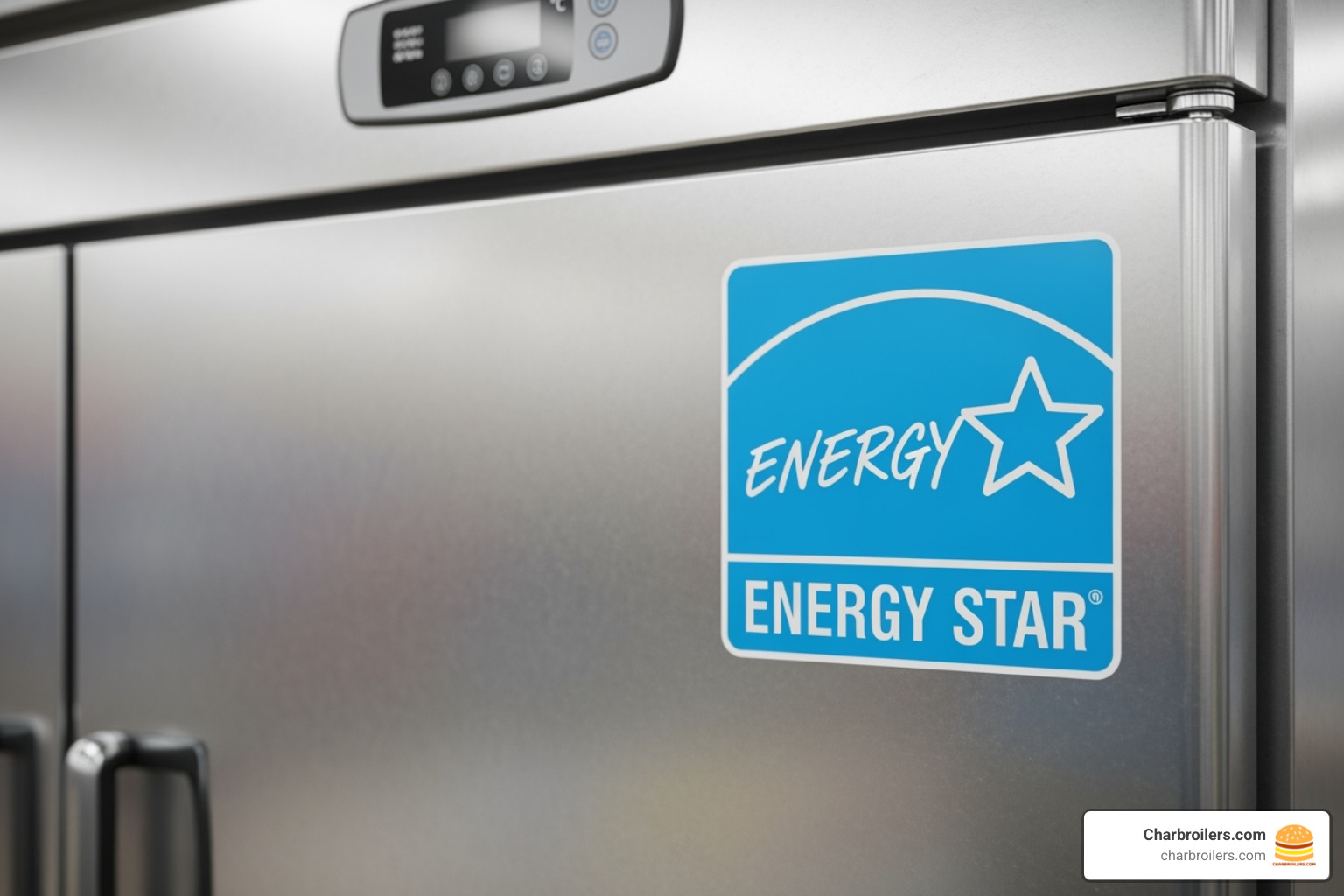
Understanding Energy Efficiency
Modern energy-conscious models are light-years ahead of older units when it comes to efficiency. We're talking about freezers that use eco-friendly refrigerants and advanced compressor technology that can slash your utility bills significantly. Some of today's most advanced units achieve a 40% lower TCO through optimized energy consumption - that's real money back in your pocket every month.
Here's something interesting: a freezer doesn't actually make things cold. Instead, it works by pumping heat out of its internal chamber. This heat removal process is where energy efficiency really matters. A full freezer is more energy-efficient than an empty one because all those frozen items help maintain stable temperatures. It's like having extra insulation working for you.
Your daily operations affect efficiency too. Frequent door openings increase energy consumption, but that's just part of running a busy kitchen. The key is choosing a commercial unit designed to handle this reality with faster recovery times and robust cooling systems. You can dive deeper into this fascinating process in our guide on Understanding how freezers work.
Regular maintenance plays a huge role in keeping energy costs down. Simple tasks like cleaning coils and checking door seals can make a dramatic difference in your monthly bills while extending your freezer's lifespan.
Purchasing and Financing Options
Let's be honest - a quality commercial deep freezer represents a significant investment. The good news is you have several smart ways to acquire the equipment you need without breaking the bank.
An outright purchase gives you immediate ownership and often the best long-term value, but it requires substantial upfront capital that many growing businesses prefer to preserve for other needs.
Rent-to-own programs offer incredible flexibility for businesses that want to test equipment before committing. Programs like "Rent–Try–Buy" let you make manageable weekly payments while applying 60% of your net rental payments toward the eventual purchase price. This approach is perfect if your business is evolving rapidly or you're still figuring out your exact equipment needs.
Don't overlook used equipment benefits either. Quality pre-owned commercial freezers that have been properly serviced can deliver outstanding value. Many suppliers strip, clean, test, and service their used units to "next best thing to new" condition. With a 90-day parts-and-labor warranty from reputable sellers, you get access to leading brands at heavily discounted prices.
Here's a financial bonus many business owners miss: rental payments are often 100% tax deductible, which can significantly reduce your actual costs. Always consult with your accountant about the best approach for your specific situation.
Warranty considerations matter regardless of which route you choose. A solid warranty protects your investment and gives you peace of mind. Whether you're buying new or used, make sure you understand exactly what's covered and for how long.
The key is matching your financing approach to your business's cash flow needs and growth plans. With the right strategy, you can get the commercial freezing power you need while keeping your finances healthy.
Installation, Maintenance, and Food Safety Best Practices
Getting your commercial deep freezer up and running properly is just the beginning. The real work starts with maintaining it correctly and ensuring it meets all food safety standards. Think of it as caring for a valuable team member – a little attention goes a long way toward keeping everything running smoothly and safely.
Proper Installation
Your freezer's location can make or break its performance. Airflow clearance is absolutely critical, especially around the back and sides where those hard-working condenser coils live. These coils need breathing room to dump heat efficiently – cramped conditions lead to overheating and poor performance. Nobody wants a stressed-out freezer!
Finding a level surface might seem obvious, but it's surprising how often this gets overlooked. An uneven floor puts unnecessary strain on internal components and can prevent door seals from working properly. Cold air escaping through gaps is money literally floating away.
For larger units, professional installation often makes sense. Commercial freezers have specific electrical requirements, and many need dedicated circuits to prevent power issues. When you're dealing with food safety and significant investment, it's worth getting the setup right from day one.
Routine Maintenance for your commercial deep freezer
Regular maintenance isn't glamorous, but it's what separates successful food businesses from those dealing with costly breakdowns and spoiled inventory. Your commercial deep freezer works hard around the clock, so returning the favor with consistent care pays dividends.
Cleaning coils should happen quarterly at minimum. Those condenser coils collect dust and debris like magnets, which makes your freezer work harder and consume more energy. A simple cleaning can dramatically improve efficiency and extend equipment life.
Checking seals is another simple but crucial task. Door gaskets and seals take a beating in busy kitchens. Try the dollar bill test – close the door on a bill, and if you can easily pull it out, that seal needs attention. Damaged seals force your compressor to work overtime, driving up energy costs.
Defrosting schedule matters too, especially for manual defrost models. Ice buildup steals storage space and makes your freezer work harder. Even frost-free units benefit from occasional power cycles to clear any stubborn ice. If you're dealing with frost-free freezer issues, our guide on Fixing Common Issues with Imperial Frost-Free Commercial Freezers offers practical troubleshooting solutions.
Ensuring Food Safety and Compliance
Food safety isn't negotiable in the restaurant business. Your commercial deep freezer is your first line of defense against foodborne illness and the legal headaches that come with it.
Temperature logging should become second nature. Consistently monitoring and documenting internal temperatures (typically 0°F or -18°C) proves your products stay in the safe zone. Health inspectors love seeing detailed temperature logs – it shows you take food safety seriously.
Preventing spoilage through proper freezing does more than protect your inventory investment. It slows bacterial growth, preserves flavor, and maintains the quality customers expect. When your freezer maintains consistent temperatures, you're protecting both your reputation and your bottom line.
Health inspections become much less stressful when your freezer maintenance is on point. Inspectors verify that equipment operates correctly and that you're following proper storage protocols. A well-maintained, compliant freezer demonstrates your commitment to running a professional operation.
By staying on top of installation and maintenance basics, your commercial deep freezer will reward you with years of reliable service, lower energy costs, and the peace of mind that comes with knowing your food is stored safely and properly.
Frequently Asked Questions about Commercial Freezers
We get it - choosing the right commercial deep freezer can feel overwhelming with so many options and technical details to consider. Over the years, we've helped countless business owners steer these decisions, and certain questions come up again and again. Let's tackle the most common ones to help clear up any confusion.
How do I choose the right size freezer for my business?
This is probably the question we hear most often, and honestly, it's one of the most important decisions you'll make. The answer isn't just about picking the biggest unit you can afford - it's about finding that sweet spot between your actual needs and your available space.
Start by taking a hard look at your current inventory patterns. How much frozen stock do you typically keep on hand? Are you buying in bulk to save money, or do you prefer smaller, more frequent deliveries? A busy restaurant that stocks up on large cuts of meat will need significantly more cubic feet than a small café that mainly freezes pre-portioned items.
Next, grab that measuring tape and assess your actual space. Don't forget to account for door swings, ventilation clearance, and room for staff to move around comfortably. A commercial deep freezer that technically fits but blocks your workflow isn't doing you any favors.
Finally, think about how you'll actually use the freezer day-to-day. If your kitchen staff needs quick access to ingredients during busy periods, an upright model with organized shelving might be worth choosing over a larger chest freezer, even if you sacrifice some storage capacity.
What's the difference between a manual and auto-defrost freezer?
This choice often comes down to convenience versus efficiency, and both options have their loyal fans in the food service world.
Manual defrost freezers require you to shut them down periodically and let the ice melt away - usually every few months. Yes, it's a bit of work, but here's why many operators swear by them: they're incredibly energy-efficient because their coils stay at optimal temperature all the time. They also maintain rock-solid consistent temperatures, which is fantastic for preventing freezer burn and keeping food quality high. Plus, they're typically less expensive upfront.
Auto-defrost models handle the ice removal automatically by cycling heating elements several times a day. The convenience factor is huge - you'll never have to schedule defrosting downtime or worry about ice buildup. The trade-off is slightly higher energy consumption and minor temperature fluctuations during the defrost cycles. For high-turnover operations where convenience trumps everything else, these units are often worth the extra cost.
How often should I clean my commercial freezer's coils?
Here's a maintenance task that can save you serious money on energy bills and prevent costly breakdowns. We recommend cleaning your commercial deep freezer coils every three to six months, but your specific environment might call for more frequent attention.
If your kitchen gets particularly dusty or greasy, you'll want to check those coils quarterly. When coils get clogged with debris, your compressor has to work overtime to maintain temperature, which drives up your electric bill and shortens the unit's lifespan.
The good news? It's actually a pretty simple job. Just make sure to unplug the unit first for safety, then use a coil brush or vacuum to remove the buildup. Think of it as a small investment of time that pays big dividends in performance and longevity.
Conclusion
Investing in the right commercial deep freezer is one of the smartest moves you can make for your food service business. It's not just about keeping things cold – it's about protecting your investment, maintaining food quality, and staying compliant with health regulations that keep your doors open.
Throughout this guide, we've covered the essential differences between commercial and residential units, helping you understand why that extra investment in commercial-grade equipment pays off. The durability, consistent temperature control, and faster recovery times of commercial freezers make them indispensable for any serious food operation.
Whether you choose a bulk storage champion like a chest freezer, an organized upright model, or a customer-facing display unit, the key is matching your equipment to your specific needs. Focus on the features that matter most: adequate capacity for your volume, robust construction that can handle daily abuse, and energy efficiency that keeps your utility bills manageable.
The sticker price is just the beginning. Smart business owners think about the total cost of ownership, including energy consumption, maintenance needs, and potential financing options. A quality commercial freezer that runs efficiently for years will save you money and headaches down the road.
Proper installation and regular maintenance aren't optional – they're essential for food safety compliance and getting the most from your investment. Simple tasks like cleaning coils and checking seals can extend your freezer's life and keep your energy costs under control.
At Charbroilers.com, we understand that choosing commercial kitchen equipment is a big decision. That's why we offer not just a wide selection of quality freezers, but also financing options that work for food service operations of all sizes. Your perishable inventory deserves better than a gamble – it deserves equipment you can count on.
Ready to find the perfect freezer for your operation? Explore our top freezer picks to keep your products fresh and find how the right commercial deep freezer can transform your business operations.
